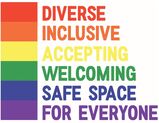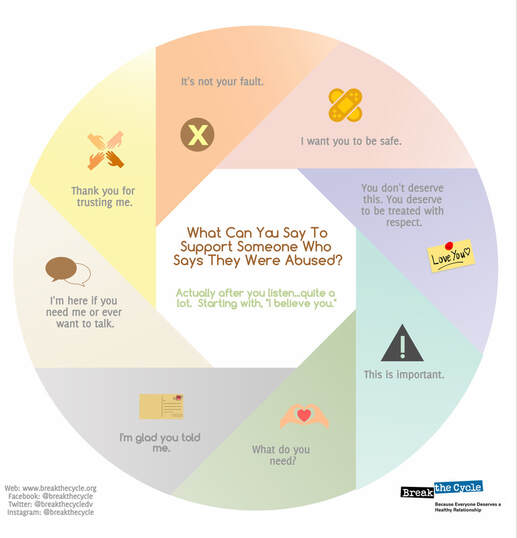Help Others
|
-
Help a Loved One
-
Help a Client/Patient
-
In the Workplace
-
Help Kids
-
General Advocacy
<
>
|
If someone you know is experiencing domestic violence, it is only natural to want to help. It is hurtful to watch someone you love suffering. You may experience feelings of frustration or anger if the victim is not prepared to leave or returns to the abusive relationship. However, while you can offer your support, it is not your responsibility to “save” victims of domestic violence. The journey to survivorship from abuse is complicated and difficult. Often, victims must attempt to leave the relationship several times before finally leaving for good. With this in mind, we discuss ways that you can be helpful in supporting victims in their journey to survivorship below: |
Educate Yourself
Take the time to learn about domestic violence, including why partners choose to abuse, warning signs of abuse, and resources for victims and survivors. For more information, browse the resources below:
- The 'Get Informed' section of our website.
- Love Shouldn’t Hurt
- Safer Families Safer Communities Campaign
- Tips for Partners of a Woman Who has Been Abused
Listen and Empathize
If a victim is ready to share their story, make every effort to understand their experiences and validate their perspective. Remind them that the abuse is not their fault and that you are here to support them. Although you can express your concern, do not show judgement or pressure them into making decisions. Ensure that you are empowering them to make their own choices, as the abuse was likely characterized by control.
Connect them with resources
If they are open to learning about available resources for domestic violence, offer your support in seeking help. For example, depending on their needs, a victim may wish to contact local shelters, outreach programs, helplines, law enforcement, legal aid, or counselling services.
- Liberty Lane offers outreach services and residential services to victims of intimate partner violence. For more information about our programs, click here.
- To download our Liberty Lane common referrals sheet, click here.
- To download a comprehensive list of support services for victims of abuse in New Brunswick, click here.
Safety Plan
If you are concerned about their safety, encourage them to make a safety plan, which outlines what you and they can do if they feel unsafe. For example, this could include informing local law enforcement of the situation in the event that the abuse was to escalate. For more information about safety planning, click on the 'Make a Safety Plan' tab of our 'Are You in Crisis?' section.
Practice self-care
Finally, remember to look after yourself. Providing support to others can take a toll on your emotional and physical wellbeing. If you feel overwhelmed, make time for self-care and talk about your feelings with someone you trust.
Throughout their journey to survivorship, victims of domestic violence often interact with a variety of service providers and allied professionals, including social workers, psychologists, counsellors, police, nurses, and doctors, to name a few. It is important for all service providers and allied professionals to understand the dynamics of abuse in order to deliver quality care to victims of domestic violence.
In addition to the resources listed in the ‘Help a Loved One’ section above, the following resources can be helpful for informing your practice if you are a service provider or allied professional:
In addition to the resources listed in the ‘Help a Loved One’ section above, the following resources can be helpful for informing your practice if you are a service provider or allied professional:
- Liberty Lane Service Provider Workshop (Call 451-2120 for more information.)
- Reasons Why All Helping Professionals Should Understand Abuse Dynamics
- Domestic Violence: A Cross-Cutting Issue for Social Workers
- Principles Informing Work with an Abused Woman
- Medical Power & Control Wheel vs. Advocacy Empowerment Wheel
- Stages of Change Model & Domestic Violence
- Helping an Abused Woman
- A Service Provider’s Roadmap to Empowering Women
“When domestic or intimate partner violence (DIPV) enters the workplace, everyone feels the negative consequences. By taking action through policies, practices, public education and good corporate citizenship, your workplace will be modeling values that show concern and respect for the individual.”
– It’s Your Business: A Domestic & Intimate Partner Violence Toolkit, NB
It is important for employers to understand how they can create a safe work environment for all employees, including those who are experiencing domestic violence. To learn more about domestic violence as it relates to the workplace, visit the visit the Public Legal Education and Information Service of New Brunswick (PLEIS-NB) website to download their workplace toolkit.
Note: Under the Employment Standards Act (2018), employees in New Brunswick are entitled to paid leave if they are a victim of domestic, intimate partner, or sexual violence, or if their child is a victim:
– It’s Your Business: A Domestic & Intimate Partner Violence Toolkit, NB
It is important for employers to understand how they can create a safe work environment for all employees, including those who are experiencing domestic violence. To learn more about domestic violence as it relates to the workplace, visit the visit the Public Legal Education and Information Service of New Brunswick (PLEIS-NB) website to download their workplace toolkit.
Note: Under the Employment Standards Act (2018), employees in New Brunswick are entitled to paid leave if they are a victim of domestic, intimate partner, or sexual violence, or if their child is a victim:
Kids who witness abuse
Exposure to domestic violence is a form of child abuse, which can have serious effects on child development and wellbeing. Children who witness abuse in the home may develop fear, anxiety, and mistrust, which can lead to low self-esteem, mental health problems, difficulties at school, or trouble making friends.
Understandably, many victims of abuse worry about how violence in the home will impact their children. Although domestic violence does increase a child’s risk for negative outcomes, children are incredibly resilient.
Supportive relationships, characterized by love, respect, and stability, can help children overcome adversity. At Liberty Lane, we specialize in adult services, but can assist you in finding appropriate services for children, including but not limited to; counselling, mentoring, childcare, and resources for parenting.
For more information about parenting in the context of abuse, consult the following resources:
Understandably, many victims of abuse worry about how violence in the home will impact their children. Although domestic violence does increase a child’s risk for negative outcomes, children are incredibly resilient.
Supportive relationships, characterized by love, respect, and stability, can help children overcome adversity. At Liberty Lane, we specialize in adult services, but can assist you in finding appropriate services for children, including but not limited to; counselling, mentoring, childcare, and resources for parenting.
For more information about parenting in the context of abuse, consult the following resources:
- Resources coming soon.
Kids who are abused
If you suspect a child under the age of 19 is being abused or neglected, you are required by law to report your concerns to Child Protection at the Department of Social Development without delay. In an emergency, call 911.
For more information about how to recognize, report, and prevent child abuse, visit the Public Legal Education and Information Service of New Brunswick (PLEIS-NB) website.
- Child Protection Services (New Brunswick) - social workers carry out assessments, make initial decisions on providing telephone crisis counselling, refer people to the appropriate regional office and/or arrange for financial assistance for special items.
- Regular office hours (833) 733-7835
- Monday to Friday, 8:15am to 4:30pm
- After hours emergency social services (800) 442-9799
- Available on weekends and holidays when regional offices are closed, 24-hours/day
- Regular office hours (833) 733-7835
For more information about how to recognize, report, and prevent child abuse, visit the Public Legal Education and Information Service of New Brunswick (PLEIS-NB) website.
The previous sections on this page speak to how you can help a victim/survivor of domestic violence and their children on an individual level. This section switches gears by speaking to how you can help address domestic violence – and violence against women in general – on a community and even societal level.
General Inquiriesoffice hoursMonday - Friday, 9 am - 5 pm
Excluding Holidays |
|



